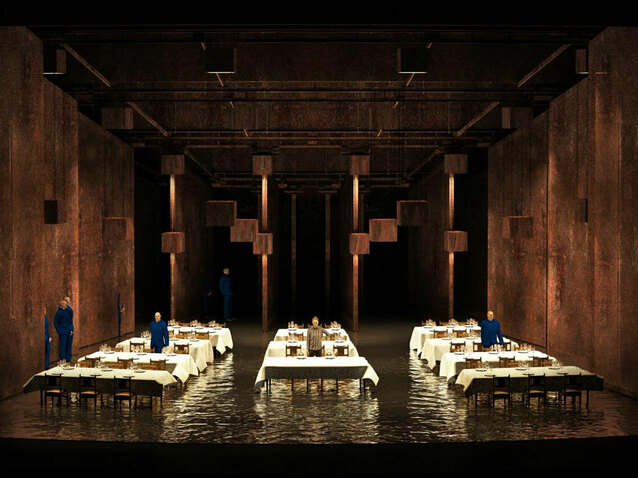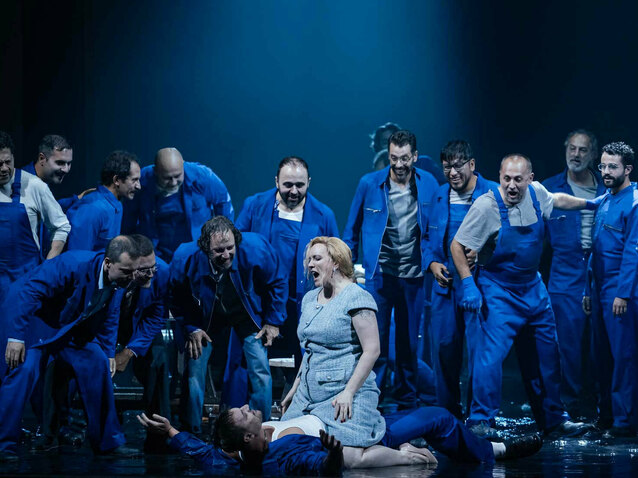 © Quique García
© Quique García
As the year commemorating the fiftieth anniversary of Dmitri Shostakovich's death approaches, smart theatres are preparing new productions of Lady Macbeth of the Mtsensk District, the composer's second, last and most famous opera, with the idea of renting it out to other theatres and thus recouping their investment.
Beyond its many musical and dramatic merits, this opera, one of the finest of the 20th century, is - unfortunately - known for the fact that Stalin disliked it and criticised it so severely that not only did it disappear from the stage for many years, but the composer came to fear for his life. Julian Barnes recounts this in his novel The Noise of Time.
Stalin, who was in a box with Molotov and Zdanov, is said to have left after the second act (as did a section, incidentally, of the Liceu audience on the day of the premiere). It was fortunate that he left at that point; if the dictator had stayed for the third and fourth acts to witness the scenes of the corrupt policemen, the drunken priest and the column of prisoners walking towards Siberia, he might have shot Shostakovich instead of only criticising him.
If Lady Macbeth triumphed on the opening night it was mainly due to the excellent work of Josep Pons, who opens his last season as chief conductor of the Liceu with this musical direction. The work is fiendishly difficult, with dynamically frenetic and rhythmically risky orchestral passages, highly complex concertantes and unusually demanding choral scenes. Pons, who has specialised for many years in 20th century music, not only knew how to solve all the problems of strict musical technique but was always perfectly in style, knowing, for example, how to add to the passages that needed it the dose of caricature and bitter, acid sarcasm that we so often find in Shostakovich.

Lady Macbeth de Mzensk, Gran Teatre del Liceu 2024 (c) Quique García
The orchestra and chorus responded excellently to the demands of the conductor and the score. The vocal soloists' part, also very demanding, was played in all the main roles by singers making their Liceu debuts.
American soprano Sara Jakubiak, who was not only making her debut at Liceu but also in the role of Katerina, was de best performer. Her voice was confident, powerful, had projection, and her dark vocal colour was appropriate to the character. Her commitment to the daring theatrical proposal made to her by the stage direction was absolute.
Pavel Černoch, who has played the role of Serguei, the lover, in several major theatres, was also ideal in all respects for the character. Ilya Selivanov was very good in the role of Zinovi, the pusillanimous husband, and Alexei Botnarciuc did very well as Boris, the lecherous, perverse and tyrannical father-in-law, but vocally a little more strength would have been needed.
In the supporting characters Goran Jurić and Scott Wilde were very good in the roles of the priest and the police chief, and the excellent stage and vocal performance of Núria Vilà in the role of Aksinia is worth noting.
Lady Macbeth is a terrible, dark, sordid opera, which includes three murders, a suicide and a gang rape, and revolves around Katerina, a sexually and emotionally unsatisfied woman who, drowned in a marriage of convenience and besieged by a depraved father-in-law, gives herself passionately to a man who is no better than those she has known so far and who finally, after a long journey of death and moral depravity, will abandon her for another woman.

Lady Macbeth de Mzensk, Gran Teatre del Liceu 2024 (c) Quique García
In Lady Macbeth, sex occupies a very important place right from the first scene, a strictly biological, savage, selfish, violent and aggressive sex, a sex that is experienced as a need that must be imperiously satisfied, perhaps providing pleasure or relief to the body but in no way happiness to the soul.
The new Liceu production of Lady Macbeth, directed by Àlex Ollé, revolves around and highlights this violent sexual drive of the play. The set, the work of Alfons Flores, dark, like the play, is made up of mobile panels that recreate in a very abstract way the spaces where the stage action takes place and that somehow evoke a kind of house that, in Katerina's spirit, is also a prison. A bed that will perform the double function of altar of pleasure where sex will be consummated, but also of altar of sacrifice where the murder will be consummated is present on stage at many moments.
The entire stage floor is covered by two inches of water throughout the work, a surprising scenic solution that Ollé has already tried out in other operatic productions (Pélleas et Melisande). The presence of the water can be understood as a premonition of death; Katerina, who states in the fourth act that ‘in the forest, in the depths of the forest, there is a lake, round and deep. The water of the lake is completely black. Black as my conscience. And when the wind whistles in the forest, the lake makes waves, great waves of fear’. She then commits suicide by throwing herself into the water and dragging her last victim with her. Surprisingly, and not very coherently with the physical presence of water on stage, in the Liceu production Katerina commits suicide with a knife.
Alex Ollé's proposal is not brilliant, but it is good. He doesn't misrepresent the play, he intensifies it, moves the characters well, characterises them theatrically and lets the narrative flow with ease.
Xavier Pujol
Barcelona, 25th September 2024
Lady Macbeth of Mtsensk by Dmitri Shostakovich. Alexei Botnarciuc, bass. Ilya Selivanov, tenor. Sara Jakubiak, soprano. Pavel Černoch, tenor. Núria Vilà, soprano. Goran Jurić, bass. Scott Wilde, bass. Mireia Pintó, mezzosoprano. Paata Burchulazde, bass. Orchestra and Choir of Gran Teatre del Liceu. Conductor, Josep Pons. Stage director, Àlex Ollé. Scenography, Alfons Flores. Costumes, Lluc Castells. Lighting, Urs Schönebaum. Production by Gran Teatre del Liceu. Gran Teatre del Liceu.
the 29 of September, 2024 | Print
Comments